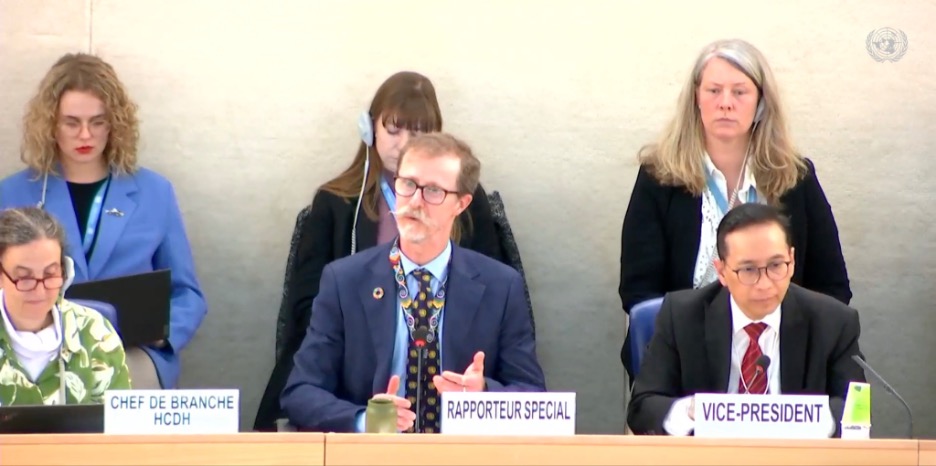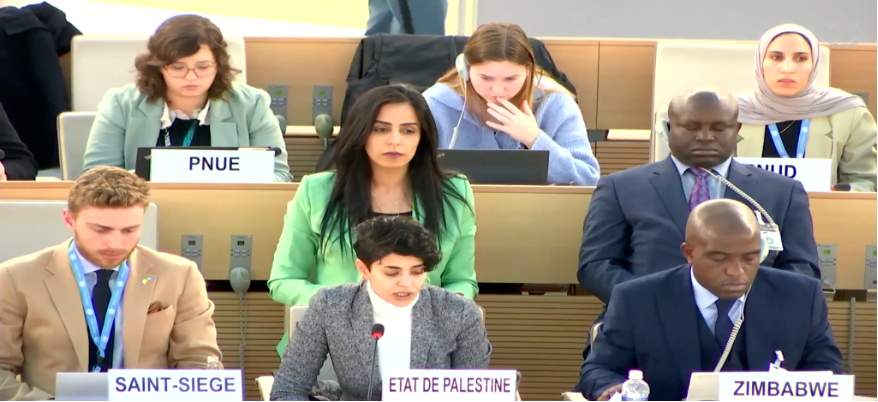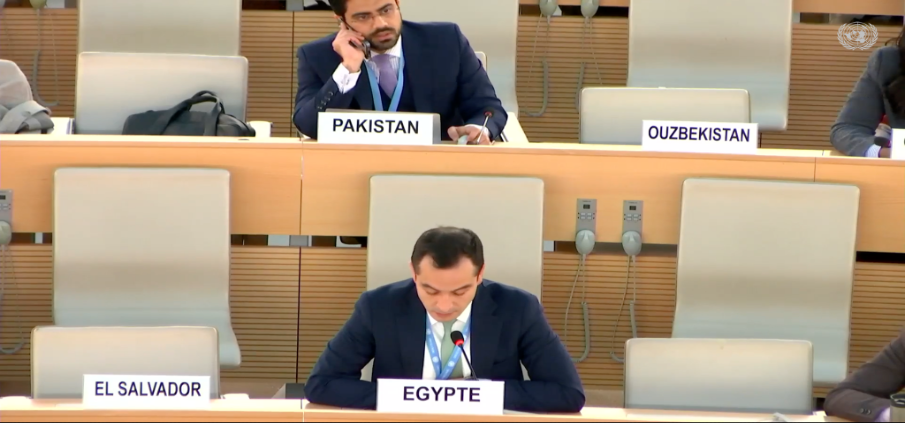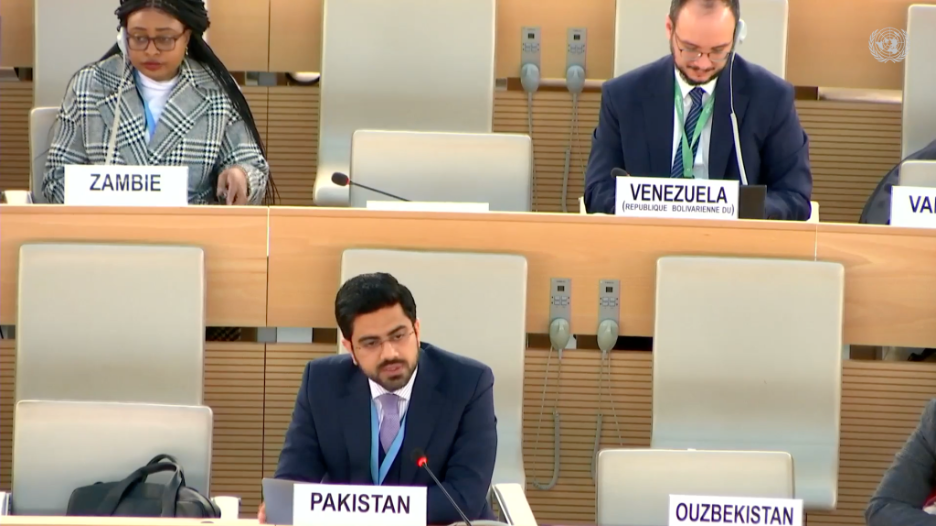The 55th Session of the Human Rights Council
6 March 2024
Agenda Item 3
Interactive Dialogue with the UN Special Rapporteur, David Boyd, on
Human Rights and the Environment

By Breshna Rani / GICJ
Executive summary
On 6 March 2024, at the 55th Session of the Human Rights Council [“HRC”], over 80 speakers from various states and non-governmental organisations like UNICEF addressed the Vice President of the HRC and presented their views on the reports of David Boyd, UN Special Rapporteur [“SR”] on Human Rights and the Environment. These thematic reports, published on 2 January 2024, titled “Business, planetary boundaries, and the right to a clean, healthy and sustainable environment”[1] and “Expert seminar on the responsibility of business enterprises to respect the human right to a clean, healthy and sustainable environment”[2], were also accompanied by the SR with two Country Reports on Chile (published on 3 January 2024)[3] and Botswana (published on 29 December 2023)[4].
The two thematic reports highlight the responsibility of business enterprises to respect the human rights to a clean, healthy and sustainable environment. They provide a comprehensive guide on the strict action businesses must take, coupled with authentic data about the current state of the environment and its ever growing negative impact on humans and their ability to enjoy a healthy life. The Special Rapporteur shed light on the urgency of protecting the environment and the costs of it[5]. For example, he reiterates that air pollution costs the world $8.1 trillion annually in damage to health and the environment and that Industrial food production imposes costs of at least $10 trillion annually[6].
All delegations welcomed the reports. Many asked further questions from the Special Rapporteur on how they can improve the right to a safe environment in their respective jurisdictions. They also inquired about tackling the challenges between having a stable economy, supporting business enterprises, and ensuring that developmental activities, as well as important foreign investments, do not critically deteriorate the environment of the residents of a state. Local communities often bear the brunt of these corporate actions in both the short and long term.
Geneva International Centre for Justice (GICJ) congratulates the Special Rapporteur for his report on protecting the environment and thanks him for his work during his mandate, which is now coming to an end. We remain extremely concerned about the effects of environmental degradation on developing states, vulnerable individuals and the global community as a whole in its search of a sustainable future. We join the Special Rapporteur in urging states and businesses to assume higher responsibility, bring more transparency into their everyday operations and most importantly, put humanity at the core of their purpose, not profit making or financial growth.
REPORT OF THE SPECIAL RAPPORTEUR
Interactive dialogue on the Special Rapporteur’s Report
On 6 March 2024, at the 55th Session of the Human Rights Council, the Special Rapporteur held an interactive dialogue regarding his report on businesses responsibility towards protecting human rights and the environment, by upholding everyone’s right to a healthy, clean and safe environment.
In this extensive dialogue, over 80 states and civil society organisations presented their views, whilst also occasionally demonstrating their actions in contributing towards a better environment. This discussion report now seeks to highlight the remarks of different states on notable topics, and illustrates the significance of each state’s contribution in the current times.
ENVIRONMENT & ARMED CONFLICT
The State of Palestine’s delegation led by Ms Dima Asfour

‘According to recent data figures, the first 60 days of the assault on Gaza produced a carbon footprint that is equivalent to over 150,000 tons of coal burned. Due to lack of transparency, these are very conservative figures. Israel is using its field testing of weapons on the Palestinian population as a selling point for its lucrative arms industry. Beyond weapons, ‘we remind this Council of the findings of the 2013 fact finding mission on Israeli settlements in which they highlighted businesses that enabled, facilitated and profited from the settlement enterprise. Many of these activities have a direct impact on the right to a healthy environment ranging from the transfer of waste to the exploitation of water and other natural resources. Eleven years after this report and decades of impunity and third state failure to act, what kind of an environment let alone a clean, healthy and sustainable one will be left for the Palestinians when occupation ends. Environmental impacts resulting from repeated military aggressions are not a mere footnote. Rather, we must allow everyone the right to live in a clean and sustainable environment, free from unexploded ordinance, chemical sediments and residues in soil, permanently contaminating the groundwater and producing consequences which will last decades’.
The State of Palestine expressed its disappointment that the report does not state or address the issue of businesses operating during conflicts and the role they play in such situations. It urged the next mandate to address these concerns and ‘the right to a healthy environment in the context of armed conflict including situations of occupation’.
Global Institute for Water, Environment and Health
led by Mr. Mohammad Almoghabat
The representatives of the Global Institute of Water said that as the delegates speak to the Special Rapporteur today, thousands of Palestinains are trapped under the rubbles of their homes, without a sign of knowing whether they are dead or alive. ‘The indiscriminate attacks have left over 70% of Gaza's residential buildings and infrastructure in ruins. Walking through the decimated streets of Gaza, one cannot deny that this is not merely a war against a specific faction but an assault on the entire population of Gaza. Amidst this devastation, a crisis of pollution looms large with Israel cutting fuel supplies for sewage and trash treatment. Streets are now littered with increasing piles of garbage with dire repercussions. Contaminated water sources spread diseases rapidly endangering the health and well-being of over 2 million residents’.
Egypt (on behalf of the Group of Arab States) led by
Mr. Shady Hesham Ibrahem Elsheha

Egypt appreciated the Special Rapporteur’s efforts to promote and protect the right to a safe, clean environment.
Egypt, without wasting the limited time of 1 min 30 seconds that each delegation is provided, took the stage to condemn Israeli aggression in the Gaza Strip. Egypt said ‘these attacks by the occupying forces have seen them destroying vast swathes of agricultural land with repercussions at the sanitary environmental level’, Egypt continued and said ‘Palestinians also face challenges with regards to waste water, untreated water in the Gaza Strip and the repercussions of pollution of ground waters’. On behalf of the Arab Group it was reinstated that the ‘tragic situation requires an immediate response from the international community which must shoulder its responsibility and call for immediate measures to put pressure on the occupying power to reach an immediate ceasefire and also to ensure an unconditional access for humanitarian assistance’.
DEVELOPING, SMALL STATES & ENVIRONMENT
The Special Rapporteur in his report stated that the annual economic costs of climate-related loss and damage will be between $290 billion and $580 billion in developing countries by 2030[7]. The per capita material footprint in high-income States is ten times higher than in low-income states. For example; the per capita income in 2022 was $76,000 in the United States of America, $88,000 in Qatar and $106,000 in Norway[8]. This should be seen in contrast to per capita income in countries like Burundi ($238), Afghanistan ($364), Pakistan ($1,597) and Kyrgyzstan ($1,607) where people are living in poverty, and require more resources to maintain a decent and healthy standard of living, fulfilling their basic needs of e.g, food, water, sanitation, electricity and housing).
Timor-Leste (on behalf of a group of countries) led by Ms. Lurdes Bessa
Ms Bessa thanked the Special Rapporteur and stated she is delivering this statement on behalf of a group of small island developing states [“SIDS”]. The statement said, ‘though we are among the least responsible for the carbon footprint, SIDS are experiencing the most profound impacts of our changing climate on human rights. For instance, the UNDP report in January 2023 found that from 1970 to 2020, SIDS lost US dollars, 153 billion USD due to weather, climate and water related hazards, while the median GDP for SIDS is 13.7 billion USD’. ‘We believe that it is important to ensure that efforts in this sphere are made in accordance with the principles of common but differentiated responsibilities and respective capabilities’. ‘There is also an urgent need for developed countries to fulfill their international commitments on climate finance, including rapid operatinalisation of the loss and damage fund’.
The principle of “common but differentiated responsibility” (CBDR) is invoked at several points within the text of the UNFCCC[9]. It recognises that while all States have a responsibility to address climate change, they are not all equally responsible for it nor equally capable of tackling it. Article 3 of the UNFCCC, therefore, delegates prime responsibility to developed nations (Annex I) to combat climate change[10].
Pakistan led by Mr Danyal Hasnain

Pakistan agreed and acknowledged the Special Rapporteur’s recommendation that business enterprises need to be more transparent about their responsibility and practices towards climate mitigation. However, Pakistan continued to emphasise and showcase their apprehension that ‘developing countries are overly affected by environmental injustice because of prevailing global structure imbalances’. Pakistan asked the Special Rapporteur, ‘what specific actions both economic and social do you recommend to business enterprises for protecting the people living in these communities’?
Pakistan is one of the most climate vulnerable states to climate change, with 173 extreme weather events occurring between 2000-2019[11], this is despite Pakistan contributing “less than 1% of the global greenhouse gas emissions”[12]. This is one of the ways Pakistan is impacted by wealthy, developed tates.
As the Special Rapporteur’s Interactive Dialogue focuses on businesses, environment and human rights, it is pertinent to mention the incident of Ali Enterprise garment factory fire in Pakistan, 2012. The fire killed 258 workers and the factory’s largest client, and customer was a German retailer KiK, whose failure to demand fire safety for workers contributed to the deadly incident. A compensation claim was brought in Germany but eventually dismissed as the statutory limitation to bring a claim had passed. This case gave rise to important questions with an attempt to clarify the responsibilities of transnational corporations towards the working conditions of their subsidiaries and suppliers abroad. Undoubtedly, the dismissal of the case on procedural grounds left families of victims without remedy and failed to set a positive precedent that foreign corporations have a duty towards their workers in developing states[13].
SPECIAL RAPPORTEUR’S REMARKS
Throughout the 17th session of the 55th HRC, many states directed questions towards the Special Rapporteur that he addressed during interval and his closing remarks. A few of the questions were;
- What positive role will the Council play in the future in combating the triple planetary crisis? - Switzerland, Mr. Jürg Lauber.
- What can we do to ensure that our transformative approach to the climate crisis addresses the disproportionate impact on women and girls? - UN Women, Ms Adriana Quinones.
- What can we do to counter the narrative that environmental obligations and human rights are obstacles to economic growth? - Costa Rica, Ms Vivian Tinoco
- What specific actions, both economic and social do you recommend to business enterprises for protecting the people living in these communities? - Pakistan, Mr Danyal Hasnain.
- How can we encourage an appropriate balance of legal and voluntary measures for positive business impact on human rights and the environment? - United Kingdom of Great Britain and Northern Ireland, Mr. Martin Rix.
The Special Rapporteur comprehensively addressed many questions and provided tangible examples that permitted the delegations and the audience to assess the impact of environment vulnerability. Beginning with addressing the best practices to adapt to navigate the public and private sector as this relates directly to the responsibility of businesses towards preserving the rights of the people and their environment. The Special Rapporteur provided examples of Chile and Botswana as a template of the practices states can introduce.
‘Chile is a major source of lithium, one of the critical minerals that is essential to the energy transition and Chile has put in place very strong public policies to ensure very high environmental standards and that the majority of the benefits from lithium mining go to the people of Chile’.
‘In Botswana there is a very flourishing diamond industry and the government recently re-negotiated its agreement with De Beers, (a world leading diamond company) so the people of Botswana get a larger share of revenue from diamond mining’.
He encouraged states, especially in the global South, to look at these two countries as models adopting high environmental standards, human rights based approaches and the majority of benefits going to the people of the states.
The Special Rapporteur did not omit mention the role of law and contractual agreements in shaping the state's part in operations of foreign business investors taking place in their jurisdiction. He said ‘One of the most important obstacles to climate and environmental progress is the international investment regime called investor-state dispute resolution [“ISDS”], this subject is critically important. These agreements were begun back in 1960’s with the idea of protecting countries in the global North from expropriation of these assets from newly independent states in the global South but this system has changed dramatically over the years and is blocked environmental progress’.
He provided an example of Pakistan, whereby Pakistan refused a proposed mine to the company Tethyan Copper due to its environmental impact on the local community in Balochistan and they were sued by the foreign investor using the mechanism of ISDS. They corporation disputed the mining operation not through the Pakistani courts but through a very secretive and selective international arbitration process which awarded the investor 5.9 billion dollars in damages[14].
Jeffery D Sachs, a leading economist also slammed this decision especially because the tribunal award was based on the expected profit Tethyan Copper would have made if the mine was operational in a span of 20-50 years[15].
The Special Rapporteur said countries should seek to eliminate these ISDS mechanisms from international investment agreements, ‘the EU has already eliminated them, Canada and US eliminated them when they re-negotiated the North American Free Trade Agreement’. He said the states should have the autonomy to refuse foreign projects if they harm the environment without bearing the loss of it. Pakistan was fined so heavily while it was already going through a debt crisis[16].
In further noting the role of law, the Special Rapporteur said it is important to criminalise severe environmental destruction and enforce these laws. One example of how some states are doing this is by introducing ecocide as a crime in their domestic law, presently 13 states have done this[17]. In 2020 the Stop Ecocide Foundation drafted a legal definition of ecocide, which in simple terms means the genocide of the environment. This definition was aimed towards introducing ecocide as the fifth crime of the Rome Statute of International Criminal Court, the official definition is;
‘unlawful or wanton acts committed with knowledge that there is a substantial likelihood of severe and either widespread or long-term damage to the environment being caused by those acts’[18].
While on an international scale ecocide is not a crime yet, states can nevertheless borrow the definition as stated above and use the work of the Stop Ecocide Foundation to get guidance and criminalise the destruction of the environment in their domestic jurisdictions.
Lastly, one of the most important things states can do ‘to facilitate transformative changes is to terminate subsidies to environmentally destructive activities’. The Special Rapporteur also answered the very important question about the role of the Human Rights Council in addressing the planetary crisis. In his remarks he said ‘it is critical for the Council to systematically integrate the right to a clean, healthy and sustainable environment into the universal periodic review process’.
The Special Rapporteur then addressed the issue put forward by various delegations about the role of the environment in war and conflict. The Special Rapporteur said, ‘in the most clear terms possible, war is fundamentally incompatible with the enjoyment of the right to a clean, healthy and sustainable environment. So I endorse the Secretary General and the High Commissioner's call for an immediate cease fire in the Ukraine, in the occupied Palestinian territory and in other conflict zones’. While it is positive to see the Special Rapporteur’s stance and support for a ceasefire, it did not directly address what businesses should do in conflict zones and how states should maintain a boundary in conducting environmentally harmful acts.
The Special Rapporteur then spoke about the impact of General Assembly Resolutions 48/13 and 76/300 that recognise the right to a clean, healthy and sustainable environment. ‘This right is being mainstreamed in multilateral environmental governance. It was included in the outcome statements of COP 27 at Charmel Sheikh, COP 28 in Dubai. It was at the heart of the Kunming Montreal Global Biodiversity Framework. It was included in the bond declaration on a future free from chemicals and waste. Just last week at the United Nations Environment Assembly it was included in five resolutions. The resolution of the Human Rights Council was a catalyst for the Committee on the Rights of the Child's General Comment 26 where that committee for the first time recognised that every child has the right to live in a healthy environment. It has also been taken up by the Committee on Economic, Social and Cultural Rights, the Committee on the Elimination of All Forms of Discrimination Against Women’.
In his closing remarks the Special Rapporteur thanked Fiji, Finland, Germany, Luxembourg, the Marshall Islands and Monaco for their financial and moral support to the Special Rapporteur and he recognised the remarkable work being done by civil society organisations. He followed this by provided examples of his first hand experiences with various individuals who have suffered environmental impact around the globe.
‘In Fiji I met a young girl who told me that she used to love going to the beach but now she does not because she is scared of the ocean. She said it seems like it is angry’.
‘In Norway I met with Sami indigenous people whose reindeer, the living heart of their culture and their economy are starving to death because of climate change’.
‘In Portugal I met with people traumatised by raging wildfires exacerbated by the climate crisis’.
‘In St. Vincent and the Grenadines I met farmers who told me it is becoming unbearable to work their crops in the heat and the humidity’
‘In Slovenia I met a grandmother who told me the names of all the relatives she had lost to cancer caused by industrial pollution in the sacrifice zone where she lived’.
‘In Chile I met a mother with tears running down her face describing her fears every day about sending her children to school because that school has experienced recurring episodes of mass poisoning by industrial pollution’.
‘I met a fisherman in Chile who was angry, so angry because his livelihood had been destroyed by industrial water pollution’.
‘I met a teenage girl who asked me how can I have good menstrual health when I do not have water in my home or at my school’.
‘Finally, I met a mother from the United Kingdom whose 9-year-old daughter, a beautiful vibrant child, was killed by air pollution. That was the conclusion of a coroner's inquest. It broke the mother's heart and her mother who is still haunted to this day by the loss of Ella, quit her job as a school teacher and became a full time advocate for the right to breathe clean air’.
CONCLUSION
The UN Guiding Principles on Business and Human Rights[19] were introduced in 2011, this was a breakthrough framework as it was the first to recognise the responsibility of businesses in upholding human rights. It ‘proposed a transparent due diligence process to identify, prevent, mitigate, cease and account for actual and potential adverse human rights impacts in global operations, supply chains and business relationships of companies’[20].
It has been more than a decade, yet since the framework is not binding but only acts as a guideline, as the name itself suggests. There is still a long way to go before each state implements and/or adopts the framework in their domestic practice or national action plans. However, GICJ urges states to focus on the practices of businesses and recognise that their role goes beyond economic growth and financial stability of a state, they play an immensely important role in protecting human rights and the environment.
GICJ truly commends the exceptional work of the Special Rapporteur and his personal incidents illustrate that his mandate on environment and human rights put people at its core and focussed on their needs and stories. It evidences how different groups of society in rural or urban areas or a child and an adult are impacted in so many destructive ways and unfortunately relating to environmental destruction unites people globally. A 9 year old child’s mother should never have to advocate for a right to breathe clean air, something that was always cost-free but now comes at a cost that is far greater than a monetary or financial loss, it is a cost to life, and it comes without redress.
We at GICJ remain concerned about the future generations as well as the current one and we join the Special Rapporteur in sincerely urging the states to take more active actions and adopt the recommendations of the Special Rapporteur and the guidance of his useful reports.
#Businesses #Environment #StateResponsibility #GenevaInternationalCentreForJustice
[1] David Boyd, “Business, planetary boundaries, and the right to a clean, healthy and sustainable environment, A/HRC/55/43, Published 2 January 2024
[2] David Boyd, “Expert seminar on the responsibility of business enterprises to respect the human right to a clean, healthy and sustainable environment”, Published 2 January 2024
[3] David Boyd, “Visit to Chile”, A/HRC/55/43/Add.1, Published 3 January 2024
[4] David Boyd, “Visit to Botswana”, A/HRC/55/43/Add.2, Published 29 December 2023
[5] David Boyd, “Business, planetary boundaries, and the right to a clean, healthy and sustainable environment, A/HRC/55/43, Published 2 January 2024, paragraph 10.
[6] World Bank Group, The Global Health Cost of PM2.5 Air Pollution: A Case for Action Beyond 2021 (Washington, D.C., 2022)
[7] David R. Boyd and Stephanie Keene, “Mobilizing trillions for the global South: the imperative of human rights-based climate finance”, Policy Brief No.5 (OHCHR, 2023).
[8] See https://data.worldbank.org/indicator/NY.GDP.PCAP.CF.
[9] United Nations Framework Convention on Climate Change [1992]
[10] Article 3, United Nations Framework Convention on Climate Change [1992]
[11] David Eckstein, Global Climate Risk Index, Germanwatch [2021] <https://germanwatch.org/> Published January 2021.
[12] Pakistan to develop National Adaptation Plan for climate change [2021], <www.unep.org> Published 25 March 2021.
[13] KiK: Paying the price for clothing produced in South Asia, <https://www.ecchr.eu/en/case//> Accessed 10 March 2024
[14] Sofia De Murad, ‘Tribunal Finds Pakistan Breached FET’, <https://www.iisd.org/itn/en/2019/12/17> Published 17 December 2019
[15] Saad Hasan, ‘Leading Economist Slams World Bank’s Unjust Arbitration Fine on Pakistan’, <https://www.trtworld.com/business/leading-economist-slams> Accessed 10 March 2024.
[16] Saad Hasan, ‘Multi-billion Dollar Fine on Pakistan Puts the Spotlight on a Secret Court’, <https://www.trtworld.com/magazine/multi-billion-dollar-fine-on-pakistan> Accessed 10 March 2024.
[17] Ecocide law in national jurisdictions <https://ecocidelaw.com/existing-ecocide-laws/> Accessed 10 March 2024
[18] Legal definition of ecocide <https://www.stopecocide.earth/legal-> Accessed 27 June 2023.
[19] Guiding Principles on Business and Human Rights, <https://www.ohchr.org/sites/default/files/documents> Accessed 10 March 2024
[20] Justice Delayed: 10 years of UN Guiding Principles <https://corporatejustice.org/news/j/> Published June 16th, 2021







